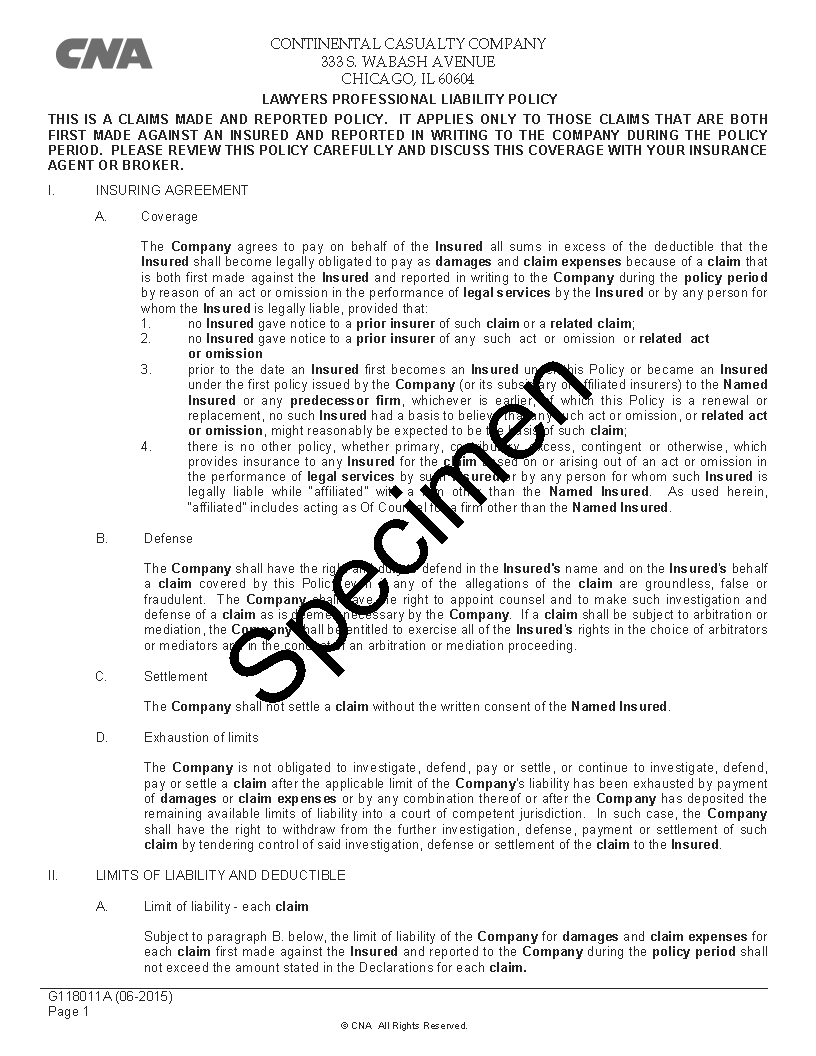
Attorneys wear many hats. Attorney malpractice insurance provides coverage for most hats but not all. A malpractice insurer’s definition(s) of professional services may cause coverage issues for attorneys that perform certain client services. If the services are provided using a license other than a law license, it is a good bet that it is not covered. When looking for the appropriate insurer, check the professional services definition against the services that your law firm provides.
CNA defines Professional (Legal) Services as:
III. DEFINITIONS
“Legal services” mean:
A. those services, including eleemosynary (pro bono) services, performed by an Insured for others as a lawyer, arbitrator, mediator, title agent or other neutral fact finder or as a notary public. Any title agency or company, on whose behalf the Insured acts as title agent or designated issuing attorney, is not an Insured under this Policy;
B. those services performed by an Insured as an administrator, conservator, receiver, executor, guardian, trustee or in any other fiduciary capacity and any investment advice given in connection with such services;
C. those services performed by an Insured in the capacity as a member, director or officer of any professional legal association, including any Bar Association and any similar organization or association, its governing board or any of its committees;
D. those services performed by an Insured as an expert witness, provided that such Insured was retained to offer expert opinion on issues related to the law, legal procedure or practice, or the legal profession; or
E. those services performed by an Insured as an author or publisher of legal research papers or legal materials or the presenter of legal seminars or materials, but only where such services are performed without compensation or compensation attributable per publication, presentation or seminar is less than $25,000.
IV. EXCLUSIONS
F. Capacity as Director, Officer, Fiduciary to any claim based on or arising out of an Insured’s capacity as:
1. a former, existing or prospective officer, director, shareholder, partner, manager or member (or any equivalent position) of any entity if such entity is not named in the Declarations; or
2. a trustee of a pension, welfare, profit-sharing, mutual or investment fund or investment trust; or
3. a fiduciary under the Employee Retirement Income Security Act of 1974 and its amendments or any regulation or order issued pursuant thereto or any other similar state or local law;
except that this exclusion does not apply to a claim based on or arising out of an Insuredʼs capacity as a member, director or officer of any professional legal association, including any Bar Association and any similar organization or association, its governing board or any of its committees.
G. Capacity as Public Official
to any claim based on or arising out of an Insured‘s capacity as a public official or an employee or representative of a governmental body, subdivision or agency unless such Insured is deemed as a matter of law to be a public official or employee or representative of such entity solely by virtue of rendering legal services to it;
H. Owned Entity
to any claim based on or arising out of legal services performed, directly or indirectly, for any entity not named in the Declarations, if at the time of the act or omission giving rise to the claim, the percentage of ownership interest, direct or indirect, in such entity by any Insured, or an accumulation of Insureds, exceeded 10%.
CLICK HERE TO OBTAIN AN ATTORNEY MALPRACTICE QUOTE
This blog is an excerpt from the policy. The complete policy along with applicable endorsements could impact the information provided above.

Lee Norcross, MBA, CPCU
(616) 940-1101 Ext. 7080